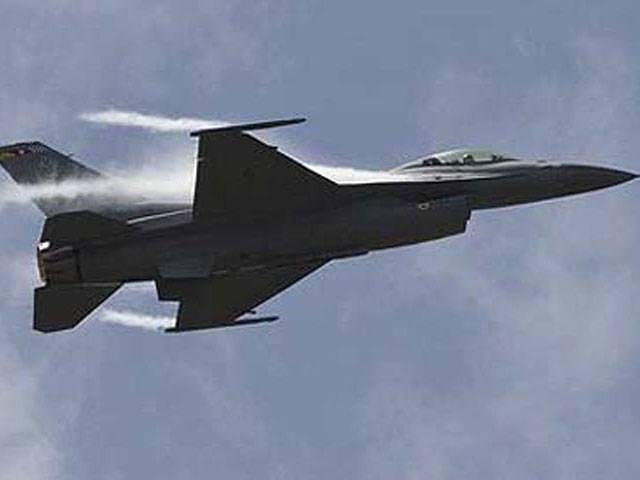ISLAMABAD/PESHAWAR - At least 25 suspected terrorists were killed and nine of their dens were destroyed when Pakistan Air Force F-16 jets bombed militant hideouts in Tirah Valley of Khyber Agency on Tuesday.
A spokesman for the Inter-Services Public Relations (ISPR) said military jets targeted nine hideouts of suspected militants in various parts of the Kokikhel area of the Khyber tribal region bordering Afghanistan.
According to ISPR, Pakistan Army jets carried out strikes early morning in Tirah Valley. Militants’ positions in Mehrban Kalley of Tirah Valley were also targeted.
The recent strikes came after the Taliban stormed Karachi airport, in an attack that killed at least two dozen people. Tehreek-e-Taliban Pakistan (TTP) had said Sunday’s assault was a revenge attack.
The airstrikes are the latest in a succession of such attacks carried out by the Pakistan military in the tribal belt this year.
The last were carried out in North Waziristan in late May, killing at least 75 suspected terrorists and causing some 58,000 people to flee from the district in fear of a full ground offensive that has been anticipated for years.
The Khyber district itself was targeted previously in April in aerial bombing that killed 37 suspected terrorists.
The district is believed to be home to several militant factions, most notably Lashkar-i-Islam led by Mangal Bagh as well foreign fighters from Central Asia.
Agencies add: The military’s death toll from Tuesday’s strikes, in the restive Tirah Valley area of Khyber tribal district, could not be independently verified. Pakistan began talks with the TTP in February, with a ceasefire agreed in March but breaking down a month later.
Many observers believe that following the Karachi attack the peace process is dead and that the government must now take more strident measures. The prime target remains North Waziristan, the main stronghold of TTP and Al-Qaeda-linked militants.
An offensive there has been long rumoured but analysts are cautious about whether the military has the ability to carry out the operation without assistance from the Afghan side of the border where militants are likely to flee in the event of an attack.
Residents’ flight from the region has been fuelled by a leaflet distributed last week by local warlord Hafiz Gul Bahadur, who is seen as friendly to Pakistan while concentrating his attacks on NATO forces in neighbouring Afghanistan.
Bahadur’s leaflet, seen by AFP, told residents to leave their homes because the government was likely to begin an offensive, and included a veiled threat to join hands with the TTP if the government did not agree to end airstrikes there.
In a statement on Monday claiming credit for the airport raid, the TTP said it was prepared “to defend the tribal brothers in case of declaration of a war by Hafiz Gul Bahadur”.
Talat Masood, a retired general and security analyst, said there was pressure on the government to target both North Waziristan as well as TTP sleeper cells in major cities, especially Karachi, which has a large population from the tribal areas.
“There is an urgent need to neutralise such attacks and the government should take firm action in the areas which are their hideouts,” he said.
“A simultaneous action should be taken against the militants in Karachi and elsewhere along with North Waziristan.”
The death toll from the airport attack rose Tuesday after the recovery of the charred bodies of seven workers who hid in a cold-storage facility to escape but were later engulfed in flames.
The victims’ families staged a protest on a main road in Karachi Monday night demanding authorities find their relatives, saying they had been in contact via telephone during the attack.
Saturday, April 20, 2024
Tirah Valley blitz kills 25 militants

Caption: Tirah Valley blitz kills 25 militants
Freedom Flotilla prepares for humanitarian aid delivery to Gaza
9:14 AM | April 20, 2024
22 suspects arrested
April 20, 2024
Policitising Tragedy
April 20, 2024
Tehran to Rafah
April 20, 2024
A New Leaf
April 20, 2024
A Tense Neighbourhood
April 19, 2024
Dubai Underwater
April 19, 2024
Dangers of Deepfakes
April 20, 2024
Feudalism
April 20, 2024
Kite tragedy
April 19, 2024
Discipline dilemma
April 19, 2024
Urgent plea
April 19, 2024
ePaper - Nawaiwaqt
Advertisement
Nawaiwaqt Group | Copyright © 2024





